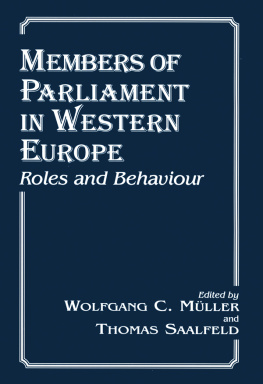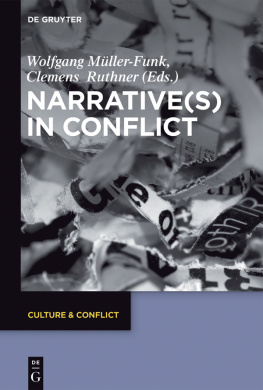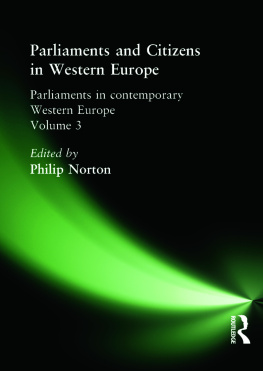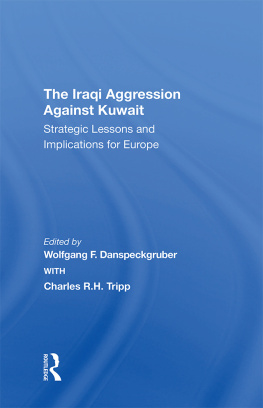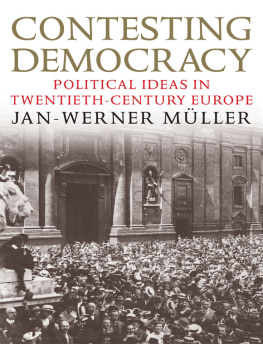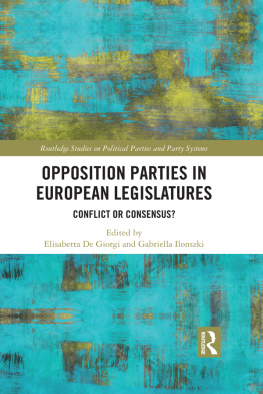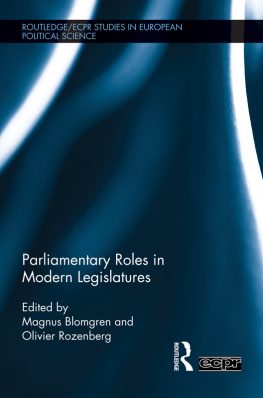MEMBERS OF PARLIAMENT IN WESTERN EUROPE
THE LIBRARY OF LEGISLATIVE STUDIES
ISSN 1357-2334
General Editor: Philip Norton
A series of new and recent books exploring the role of legislatures in contemporary political systems. The volumes typically draw together a team of country specialists to provide in-depth analysis.
1. Parliaments in Western Europe
edited by Philip Norton
2. The New Parliaments of Central and Eastern Europe
edited by David M. Olson and Philip Norton
3. National Parliaments and the European Union
edited by Philip Norton
MEMBERS OF PARLIAMENT IN WESTERN EUROPE: ROLES AND BEHAVIOUR
edited by
WOLFGANG C. MLLER
and
THOMAS SAALFELD
First published in 1997 by
FRANK CASS AND COMPANY LIMITED
This edition published 2013 by Routledge
2 Park Square, Milton Park, Abingdon, Oxon OX14 4RN
711 Third Avenue, New York, NY 10017
Routledge is an imprint of the Taylor & Francis Group, an informa business
Copyright 1997 Frank Cass & Co. Ltd
British Library Cataloguing in Publication Data
Members of parliament in Western Europe: roles and behaviour
1. Legislators - Europe, Western
I. Mller, Wolfgang C. 1957- II. Saalfeld, Thomas,
328.40922
ISBN 0 7146 4821 3 (hbk)
ISBN 0 7146 4369 6 (pbk)
Library of Congress Cataloging-in-Publication Data
Members of parliament in Western Europe: roles and behaviour edited by Wolfgang Mller and Thomas Saalfeld
p. cm.
This group of studies first appeared in a special issue of the Journal of legislative studies, vol.3, no.1 (spring 1997) T.p. verso
ISBN 0-7146-4369-6. ISBN 0-7146-4821-3
I. Legislators - Europe, Western. I. Mller, Wolfgang C., 1957
II. Saalfeld, Thomas, 1960
JN94.A71M45 1997 | 97-764 |
328.092.24DC21 | CIP |
This group of studies first appeared in a Special Issue of The Journal of Legislative Studies, Vol.3, No.l (Spring 1997), [Members of Parliament in Western Europe: Roles and Behaviour].
All rights reserved. No part of this publication may be reproduced, stored in a retrieval system, or transmitted in any form, or by any means, electronic, mechanical, photocopying, recording or otherwise without the prior permission of the publisher
Thomas Saalfeld and Wolfgang C. Mller
The terminology of role theory is borrowed from the stage. Superficially, similarities between stage and parliaments may have encouraged scholars to apply it to legislatures. Indeed, everyone who has an opportunity to watch the spectacle of Speakers Procession in the British House of Commons, or the highly ritualised conduct of Prime Ministers Question Time, will find the analogy intuitively plausible. The adoption of ancient and ultimately aristocratic forms of behaviour even by early twentieth-century Labour Members of Parliament with a classical working-class background seems to testify to the validity of one of role theorys central claims, namely that role structures, once stabilised, tend to persist, regardless of changes in the actors. Yet, the importance of role theory in legislative studies goes far beyond analogies of this type. In its various guises, it has constituted one of the most influential traditions in social theory and research1 and has had a significant impact on empirical legislative research. This volume will provide a survey of empirical work on legislative roles in some western European parliaments: Belgium, Denmark, Germany, the Netherlands, Norway and the United Kingdom.
The empirical evidence presented aims to broaden the debate and provide both empirical material and theoretical stimuli to use, test and further develop role theories of legislative behaviour. Kaare Strms contribution to this volume and Donald Searings works (see below) show that role theory can and does provide useful theoretical elements, even if its structural-functionalist premises are no longer the predominant paradigm in the social sciences. The individual contributions have not been based on a tightly formulated, common theoretical framework. They originated from papers presented to the Vienna Conference on the Political Roles of MPs in West European Countries (April 1995). Nevertheless, all contributions have been theoretically informed by two classical works in the field which will be referred to below and by a number of guiding questions set out later in this introduction.
The volumes primary aim is to take stock of our empirical knowledge on legislative roles in different western European parliaments and explore possibilities to integrate some of the fundamental findings of traditional role theory and more recent approaches to the study of parliamentary behaviour. Some authors (Philip Norton, Thomas Saalfeld) attempt to explore how roles help us to understand the impact of changes at the macro- and meso-levels on parliamentary behaviour. Most contributions to this volume (Rudy B. Andeweg, Erik Damgaard, Lieven De Winter, Knut Heidar and Werner J. Patzelt), however, focus upon individual-level data. They present a wealth of empirical findings that are not easily accessible outside the respective countries. These data should help assess the interaction of roles and varying institutional constraints the importance of which becomes particularly evident in Werner Patzelts study of roles in the quasi-experimental context of Germany after unification. Instead of a conclusion, Kaare Strm presents a theoretical chapter which explores the meaning and usefulness of the concept of role for scholars who do not necessarily share the holistic assumptions of early role theories.
The Concept of Role in the Social Sciences
The concept of role concerns the tendency of human behaviors to form characteristic patterns that may be predicted if one knows the social context in which those behaviors appear.2 Role theorists have never been particularly modest in their claims. Robert E. Park, for example, maintained that everyone is always and everywhere, more or less consciously, playing a role. It is in these roles that we know each other; it is in these roles that we know ourselves.3 According to another definition,
role provides a comprehensive pattern for behavior and attitudes; it constitutes a strategy for coping with a recurrent type of situation; it is socially identified, more or less clearly, as an entity; it is subject to being played recognizably by different individuals; and it supplies a major basis for identifying and placing persons in society.4
With respect to legislatures, Wahlke et al. have defined role as
a coherent set of norms of behavior which are thought by those involved in the interactions being viewed, to apply to all persons who occupy the position of legislator. It is important to emphasize the normative aspect of the concept in order that the role of legislator not be confused with the office, or position, of legislator. the concept postulates that legislators are aware of the norms constituting the role and consciously adapt their behavior to them in some fashion.5
Role theory evolved in various traditions with contrasting definitions of concepts and frequent disagreement about substantive issues. It is beyond the scope of this introduction to provide an exhaustive survey of these different traditions. It seems to be appropriate, however, to draw attention to two traditions that have had a fundamental impact on some of the early classical studies on legislative roles, namely the functionalist tradition and symbolic interactionism. The functionalist perspective was strongly influenced by the contributions of Talcott Parsons to social theory. It was concerned with the problem of explaining social order. Functionalists in the Parsonian tradition hold, in essence, that the stability of social systems arises from consensual expectations, or roles. Roles provided norms for conduct. Compliance with norms was induced either because the social system imposed sanctions on actors or because actors had internalised them. Internalisation of norms was a result of socialisation processes: those in the system were thought to be aware of the norms they held and taught them to novices.6 Symbolic interactionists think of a role as a line of action that is pursued by individuals within a given context of pre-existing norms, beliefs, attitudes, the actors conception of self and the definition of the situation that evolves as the actors and others interact. This perspective can be applied to describe the complex network of relationships amongst Members of Parliament and between Members and other actors in the political system.


